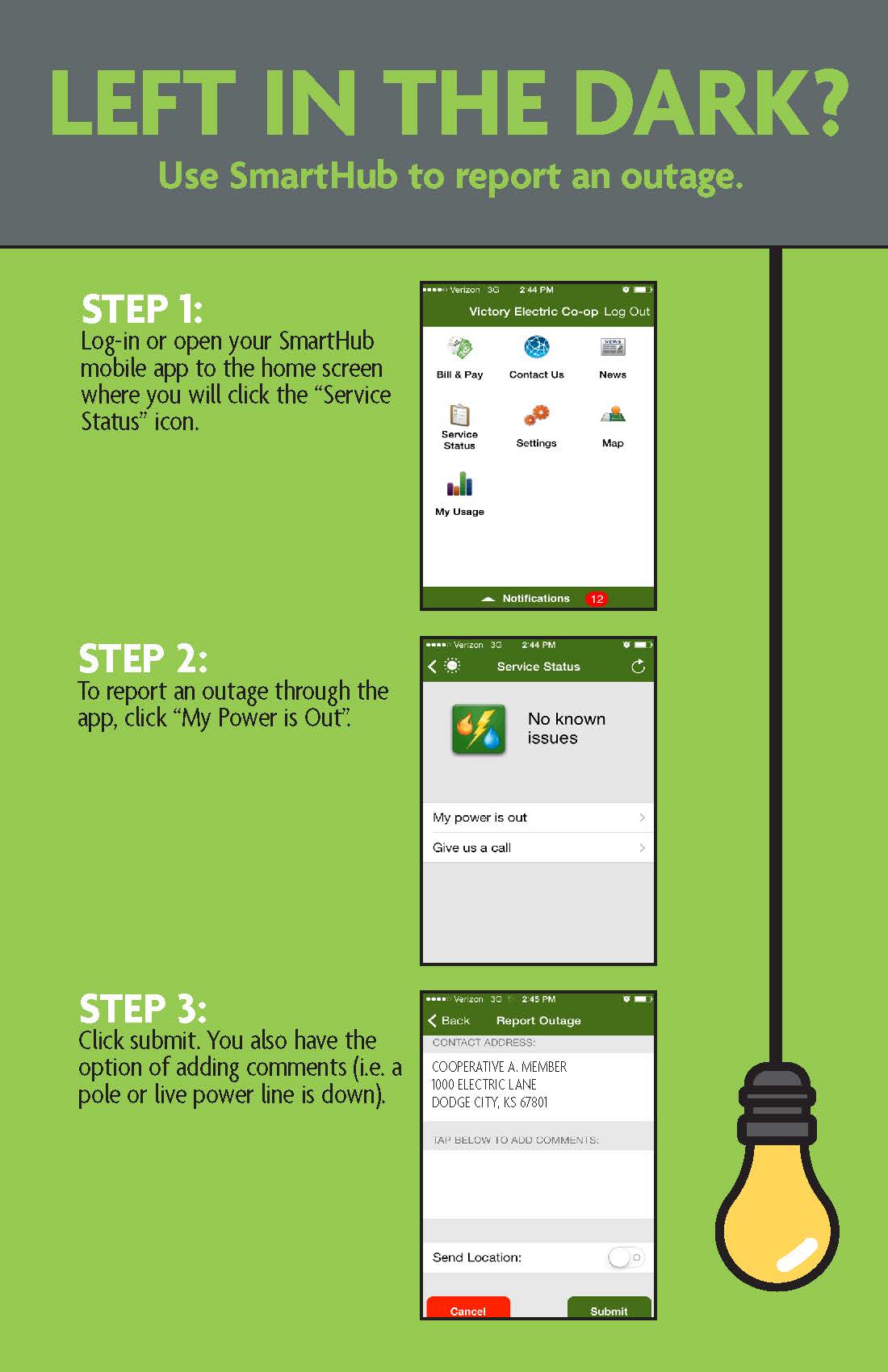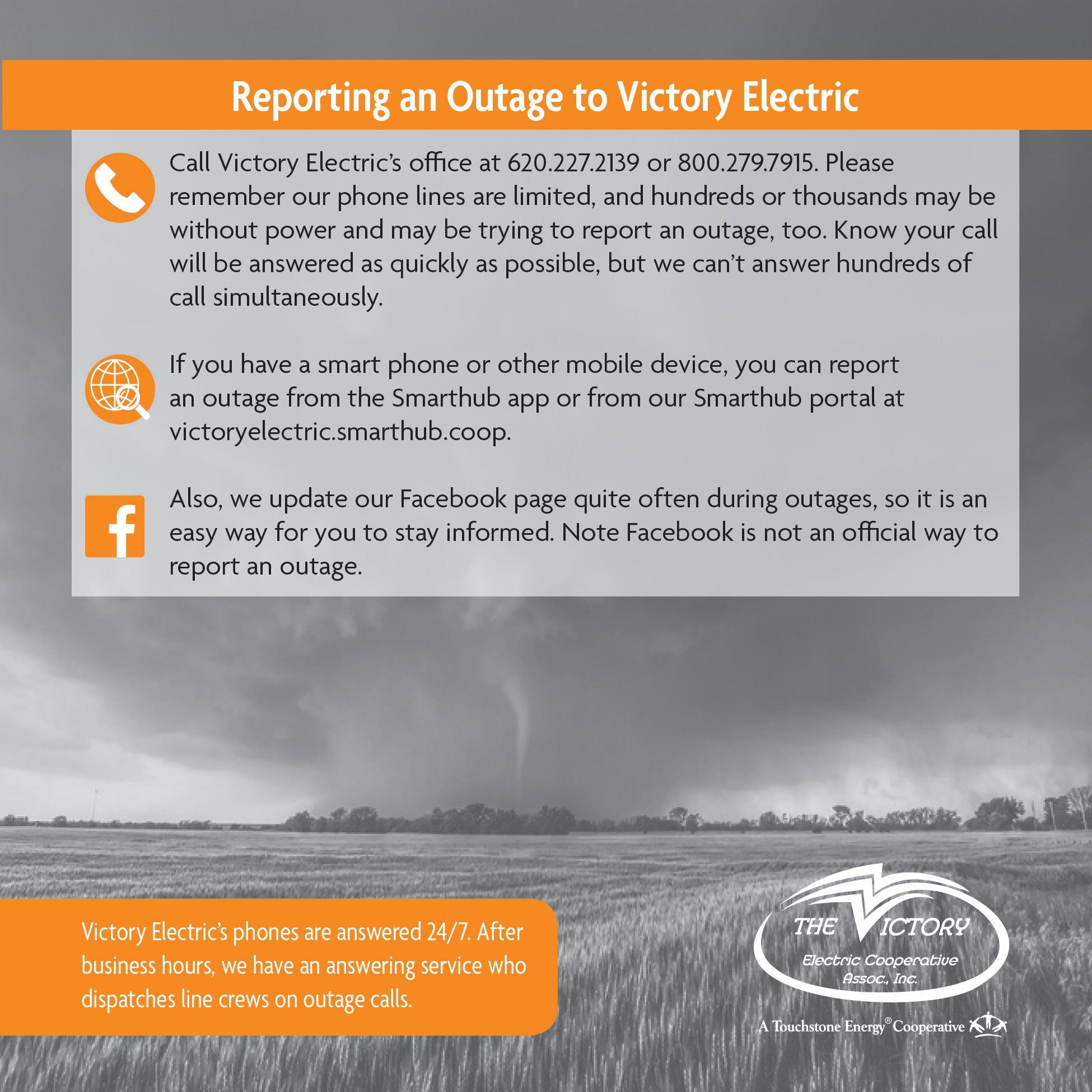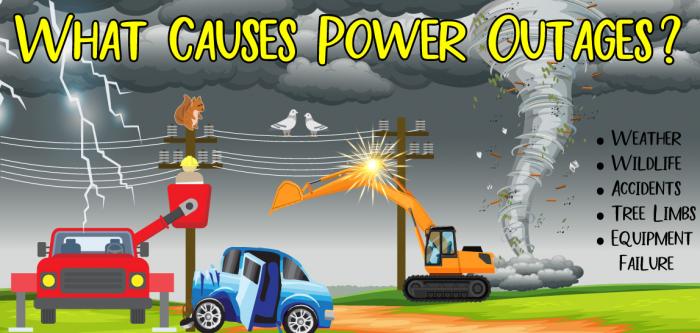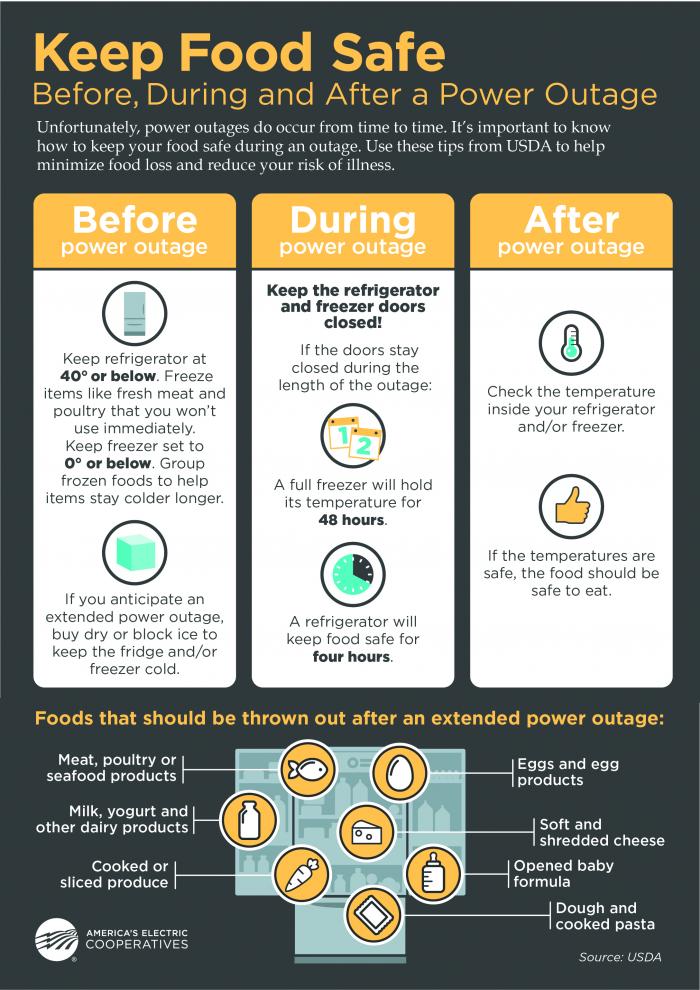If you are experiencing a power outage, please call our office at 620-227-2139 or 800-279-7915. Thank you!
In Kansas, weather-related outages can occur during any season. Weather can create dangerous situations for all of us, including the Victory Electric line crews who are out working to get your power safely restored as quickly as possible. While we strive to provide reliable service at the lowest cost possible, there may still be unavoidable circumstances that knock out your electricity for short periods.

First, please check the fuses and circuit breaker. Then check your neighborhood to determine if the electricity is out in your area. Power outages are rarely limited to one home. If you find yourself without power, contact a neighbor. If their power is out too, it is time to notify Victory Electric of the problem. Report your outage to Victory Electric. Do not rely on your neighbors to report your outage. By Phone: please provide the member service representative with the name on the account, the account number or meter number, and the address. If there are several outages you may receive a busy signal. If your call is not answered immediately, it may mean others are out of power and Victory Electric representatives are working as fast as possible to answer telephones and dispatch crews to restore service. Online: As a member of Victory Electric, you have access to SmartHub, our online web. In addition to being an account management and payment tool, the website and mobile app make reporting an outage easy. Login or set up an account with SmartHub to get started. SmartHub App: Login and select "Report/View Outage Status" and then select "Report Outage." SmartHub web: Login and select “Report an Outage” under the quick links section. Outage Text Messages: Sign up to receive outage alerts via text message when your power goes out. You’ll also receive text messages when power at your home or business is restored. You must have a Victory Electric SmartHub account with a current cell phone number on file in order to participate. For instructions on how to create a SmartHub account or sign up for power outage text alerts, please follow the instructions. *Notifications are based on Victory Electric’s predictive outage management system and may not be 100% accurate. Feel free to check our Facebook page for any current outages at facebook.com/victoryelectric Our crew and staff are working as quickly as they can to get your power restored. We would appreciate your patience. Sometimes the conditions they work in can be dangerous, and safety is a priority. Our crews will only work to restore power as long as it is safe to do so. Listen to the local radio station on your battery-operated radio for regular news and weather updates. Turn off all appliances, including your furnace, air conditioner, water heater, and water pump. Leave on one lamp to know when power has been restored. That way, you can avoid a circuit overload and another outage that may result when power is restored to all appliances at once. Follow safe operating procedures for generators. Never operate one inside your home or in an enclosed space, such as a garage. If you must travel, please help protect line workers and crews when you see them on the roadside making emergency repairs. Move over from the lane nearest the workers or slow down until you can safely pass the work site. Stay away from downed power lines, flooded areas, and debris. Treat all fallen wires and anything touching them as though they are energized. Immediately report downed lines to Victory Electric.
- When Victory Electric experiences a large-scale power outage for at least half an hour or longer, we try to update our Facebook page with the available outage information as soon as possible.
- Even if we’ve already posted outage information, we might still need your information. Please report all outages by calling 620-227-2139, so your location can be automatically entered into our outage system. You can also report an outage on your mobile device through SmartHub.
- The majority of Victory Electric outages are restored in two hours or less. Keep in mind, there are many factors to consider when estimating restoration time – weather conditions, the time of day or night and the resources required to determine the cause of an outage.
- Sometimes an outage is experienced by the people who provide power to us. When we report a transmission outage, this means a large utility supplying power to one of our substations is experiencing an issue. Sometimes Victory Electric crews assist in restoring these outages, and sometimes the cooperative has to wait for restoration just like you do.
- If you or any member of your family use essential life-sustaining medical equipment prescribed by a physician, please make sure to have a medical necessity form on file with Victory Electric. This helps us to contact you in the event of a scheduled power outage for maintenance purposes. Please be sure to acquire a back-up power supply (batteries, generator) for any medical equipment that requires a constant power supply.

Frequently Asked Power Outage Questions
Victory Electric does everything possible to keep the power on, but sometimes Mother Nature has other ideas. Here are some factors that contribute to power restoration during and after a storm.
This is by far the most asked question, and we wish we had a crystal ball. There are just too many factors to consider, and each outage is different. When the cooperative is dealing with a small, one location outage, our average restoration time is just over an hour. But when several thousand households are out, it will take longer due to outage complexity, time and manpower. You might be one of the first neighborhoods restored, or the last, and to give an estimated time would not be accurate due to unexpected situations that arise during widespread outages.
If you would like to sign up for text notifications for when the power goes out and when it is restored, please sign up for our outage notifications through SmartHub.

- Animals and trees making contact with wires can cause an outage.
- Other events like digging, construction or automobile accidents can cause damage to power poles or lines.
- Farm-related accidents can also cause outages.
- Equipment failure can also be a reason for an outage.
- An overload may also cause equipment to fail. We typically see these problems on extremely hot, or high peak days, during the months of May through September.
- Power supplier failure can cause outages on our line. We are reliant on our power suppliers, and if they experience major outages, those outages may affect our system.
When an after-hours storm hits, our linemen are at their homes, their kids’ ball games, out to dinner and basically enjoying evening activities like everyone else. To be prepared, on-call crews are within 20 minutes of the office, and once notified of an outage they still have to “suit up” and drive to the outage location, assess the situation (often patrolling miles of power line to find the cause of the outage). Also, at times they may need to return to the cooperative’s warehouse to get additional materials, such as poles and power transformers to make repairs. Sometimes the fix is as easy as resetting a fuse but sometimes it involves replacing a broken pole.
Your home may be on a different distribution line than your neighbor. To handle the load neighborhoods, businesses, towns, and individual residences are powered by different lines, substations, and electric poles.
Safety is always the first priority. Crews give immediate attention to dangerous situations, such as power lines down on roadways or streets. After that, the substations and primary lines, where the greatest number of members can be restored at once receive attention. Crews then focus on smaller lines to restore power to smaller groups of members. Last, crews work on damage to individual service connections. Visit our How Power is Restored page for more information.
Your lack of power could be due to equipment that is your responsibility to maintain. Victory Electric maintains the system up to a connect point. For underground service, that is either a transformer, pedestal or underground connection point at a meter socket. For overhead lines, the connect point is usually the weather head mast on your home. You will need to consult an electrician for these repairs.
While we cannot control weather or all circumstances, we can work to limit power outages by:
- Maintaining our equipment during planned outages
- Tree trimming to limit line damage
- Investing in new equipment and technology
- Employee training
- Built-in backups and stock materials for quick replacement
Storm damage cleanup is the responsibility of the property owner.
Ever had your lights blink for just a split second or 5 seconds? We call that a power blink - a brief interruption that is designed to prevent an extended power outage. Blinks occur when an object, such as a tree limb, comes into contact with a power line or other equipment. If the limb remains on the line, the breaker opens and tries to close again. If the obstruction is still on the line after the third try, the breaker opens and does not close automatically - requiring a crew dispatch and to report the outage. To prevent damage to the power line equipment or your home, a circuit breaker interrupts the electricity for a fraction of a second. There is no need to report such a blink as an outage. However, if you experience multiple blinks over the course of 24-48 hours, check your in-home breakers for any electrical issues. If no issues are found, call us.
Falling trees and branches are huge culprits causing power outages. No one likes cutting down trees, but Victory Electric have right-of-way clearance to remove branches that interfere with power lines. If you have a tree that is close to an overhead line, contact us and we will send a tree trimming crew assess the situation.
Also, having a correct phone number on file with our office helps us restore outages quicker. When you call, your location is automatically added to our system, which gives dispatchers a better idea of where problem areas exist. You can update your contact information by calling our office or visiting our online web portal SmartHub.
- Keep freezer and refrigerator doors closed. Food will stay frozen for 36 to 48 hours in a fully loaded freezer if you keep the door closed. A half-full freezer will generally keep food frozen for 24 hours. For refrigerated items, pack milk, other dairy products, meat, fish, eggs, gravy, and spoilable leftovers into a cooler surrounded by ice. Inexpensive Styrofoam coolers are fine for this purpose.
- Avoid damage from electrical surges by turning off all appliances, including your furnace, air conditioner, water heater, and water pump. Leave on one lamp to know when power has been restored. That way, you can avoid a circuit overload and another outage that may result when power is restored to all appliances at once.
- Have alternate plans for refrigerating medicines or using power-dependent medical devices.
- Check on your neighbors.
- If using portable stoves, kerosene heaters, or lanterns, make sure that the area is sufficiently ventilated.
- Carbon Monoxide–The CDC advises the public to never use generators, grills, camp stoves or other gasoline, propane, natural gas or charcoal-burning devices inside a home, basement, garage or camper. CO is an odorless, colorless gas that can cause sudden illness and death if breathed. When power outages occur during emergencies, people often try to use alternative sources of fuel for heating, cooling and cooking. CO from these sources can build up in the home and poison the people and animals inside.
- If it is hot outside, close drapes and blinds on the sunny side of your house, drink plenty of fluids, take your pets to a cool basement location, and go to an air-conditioned civic center, mall, or library if necessary to stay cool.
- Dress appropriately during hot weather by taking steps to remain cool. Wear lightweight, light-colored clothing.
- If you remain at home, move to the lowest level of your home, since cool air falls.
- Drink plenty of water, even if you do not feel thirsty. Your body is trying to cool down and will use up reserves.
If it is cold outside, open your blinds during the day, cover windows with drapes at night, avoid alcoholic beverages, and gather in a central room where there is an alternative heat source, such as a fireplace or kerosene space heater. If the indoor temperature drops to 55°F or below, open your faucets slightly so they constantly drip to prevent pipes from freezing. If safe to travel, go to an alternate location for heat.
- To deal with cold weather, wrap in warm clothes. Wear several thin layers instead of one or two bulky items. Hats and thermal underwear can also help keep you warm
- At bedtime, use several layers of quilts or blankets. Better yet, use a sleeping bag.

- Don’t go out at night to look at storm damage. There may be a downed power lines or other debris that can cause serious injury.
- If you clear trees on your property, don’t try to remove those tangled in power lines.
- Stay away from downed power lines – always assume the lines are “live.”
- If you think your home may have water damage — from roof leaks or flood waters that have receded follow these important safety tips:
- Disconnect all electrical appliances that are still plugged in. Use caution. Do not stand in water when operating switches, plugging in or unplugging electrical cords.
- When resetting circuit breakers, wear dry, rubber-soled shoes and stand on something dry and non-conductive, such as a dry piece of wood or wooden furniture.
- Use only one hand, and reset the breaker switches with a dry wooden tool. Do not make contact with the metal breaker box or other grounded objects in the area. If the breakers will not reset or they continue to trip, call a licensed electrician. This condition might indicate a short-circuit in your electrical system.
- If you had no problem resetting the circuit breakers, you will still want to check your appliances for water damage and make sure all cords are dry before you attempt to re-plug electrical appliances into wall sockets.
- If, after plugging in an appliance, the breakers trip (or fuse blows) or you see smoke or smell a burning odor, shut off power at the circuit breaker and have the appliance checked by a qualified appliance serviceman.
- Be very careful around all electrical wires and equipment. If you have any doubts about your home electrical system or are unsure of how to proceed, call a professional, licensed electrician.
